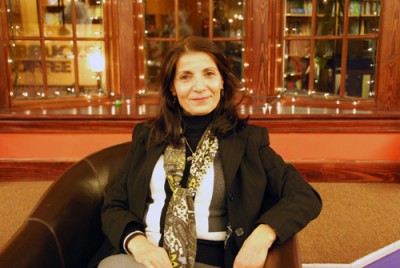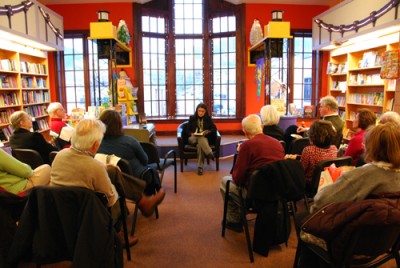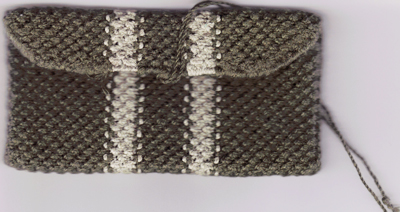Shahla Talebi and Rekindled Memories of Imprisonment in Iran
by Guest Contributor / March 7, 2011 / 1 Comment

Shahla Talebi. Photo: Jenelle Pifer
Iranian political activist Shahla Talebi survived over a decade of imprisonment, first from 1977 to 1978 and again from 1983 to 1992. While in jail, she was subjected to physical, verbal, and psychological abuse. In 1998, she survived the mass execution of thousands of political prisoners, including her husband Hamid.
After her release, she fled Iran and relocated in the United States. She attended UC Berkeley as an undergraduate and received her masters and doctoral degrees from Columbia University. Now she is an assistant professor of religious studies at Arizona State University and recently published Ghosts of Revolution: Rekindled Memories of Imprisonment in Iran through Stanford University Press.
She also just completed her stay on the Robert Morris University campus as a 2011 Rooney Scholar and closed her time in Pittsburgh with a reading at the Penguin Bookshop in Sewickley on Friday, February 25.
In this interview she discusses her experience as a political prisoner in Iran, the current political landscape in the Middle East, and the role of women in Muslim countries.
You began your book in 1999, meaning it took you just over a decade to complete. Can you tell me about your writing process?
I wrote this initially as my undergraduate honors thesis when I was a student at UC Berkeley, but I decided against publishing it. With what happened last year in Iran, I started thinking that there was something that I could go back to, so I started revisiting the text. I sent it to the publisher and they were interested. It was my way of somehow connecting myself to the events in Iran, because at the time I couldn’t go back. So, it wasn’t like I was working on it for the last ten years or so. It was instead a return to the work.
After leaving Iran in 1993, have you been able to visit the country?
I went back to Iran three times. I went back to Iran in the summer of 2002 and again for almost a year from 2003 to 2004. I did my fieldwork in Iran, and I was in Iran when the earthquake in Bam happened; I was there for a few months back and forth. I went back the last time in 2005, in the spring, and I started thinking about the youth, how this new generation is going to bring a different kind of movement. It’s going to bring a different kind of political environment, and it’s already had its own indications, and that’s what I write in part of my dissertation—about the youth and the fresh air that they’re bringing to the society.
Does your family still live in Iran?
Yes, and that has been one of my concerns. In talking about these issues and writing about them, it’s always been one of the very difficult challenges: how to write, what to write, and what not to write.
Toward the beginning of the book you ask yourself who you are writing for. Now that the book is complete, how would you answer this question?
How do I say who I am writing to? Near the end I realized that I’m writing to whoever it is who has a sense of cultural and social consciousness and is interested in learning about others’ stories, others’ suffering, others’ experiences. This is not just for the dead, because the dead never die in these stories; this is not simply for the living, because the living cannot live without remembering the dead; this is not only for the Iranians, because the Iranians do not exist in a vacuum; it is not only for the Americans, because the Americans cannot relate to the story without being able to relate to the story of others. In the end, what I can say is that I’m hoping that I’m talking to the humanness of humanity, the humanity of humans.

Reading at the Penguin Bookshop in Sewickley on Friday, February 25. Photo: Jenelle Pifer
Throughout the book you revisit the theme of sleeping while awake to illustrate both the corporeal numbness resulting from physical torture and the emotional barriers you constructed to maintain sanity. How were you able to block out your surroundings in these ways without becoming indifferent?
It was and is a very difficult challenge. How do you make a balance between remaining sensitive and human in the midst of this kind of impossible situation, and yet not go insane? A right mind—whatever a right mind means—would go insane just witnessing what some of us witnessed. It’s a constant challenge to remain awake while sleeping, and to dream while your dreams are constantly being killed inside you.
It really is a constant struggle. For example, right now I’m reading about and watching what’s going on in Libya, what’s going on Iraq, what’s going on in Egypt. In Libya, they essentially go after their own people and bomb their own people, which is what happened in Iran, in Kazakhstan, in Iraq. It happened in many other places and unfortunately it’s done by the U.S. on other countries. So, being witness to that, what I keep thinking is, “How do I live? How do I sleep every night knowing that it could be me there being killed or being the one who could kill?”
Basically what I try to do is remain my life as much as possible but also leave a space for my psyche. Sleep is a similar necessity for a society. If a society fought every single moment with the might of a revolutionary movement, it could not survive. It requires moments of resting and finding strength. I sometimes have to really put myself to sleep on some things, because if I don’t, I don’t think that I could survive. It’s creating a balance: not going to sleep for your whole life and being a dead woman or man, walking. Unfortunately it is possible for us to live for a long time without knowing what’s going on around us. That’s something I’m hoping that I keep struggling not to fall into.
Throughout the book you write about creativity in prison, emphasizing the idea that creating something physical was, in a sense, a prisoner’s way of remaining human. I understand that Hamid, your husband, was able to craft and deliver gifts to you, including an incredible wallet he knit from the pulled thread of his socks. Logistically, how was he able to get the gift into your hands?
That actually got to me in a most beautiful and interesting way. A friend of mine was called to interrogation while my husband was also under interrogation. We knew each other, and she knew of my husband, but they had never met. She hears my husband being beaten and she hears his name being called. She hears them asking about me, so she knows “Oh, this is Shahla’s husband.” When they came out, they were both in the hallway waiting for another round of interrogation. She whispered to him that she was with me in the ward. Hamid had carried this thing, hoping.
In this particular case we were lucky. He gave it to her, and she brought it to the ward. Years later when we had this behind-the-window kind of meeting, I told him that I received it and he said, “Oh, my God.” Even in the midst of interrogation and torture I marvel at the strength of love and connection. I talk about this a lot in the book.
 Wallet made of the thread of Hamid’s socks in the interrogation period. Photo: Courtesy of Shahla Talebi
Wallet made of the thread of Hamid’s socks in the interrogation period. Photo: Courtesy of Shahla Talebi
You also focus on the role of women in the revolution, emphasizing their experiences in prison. How has the role of women in Iran changed since you left the country in 1993?
There is a change, and there is a continuity, of course. There is a notion that Middle Eastern countries are considered the Muslim world, where women are usually seen as oppressed and passive. Women have actually been totally the other way. They have been at the forefront of all social movements from very early on—at least since the beginning of the 20th century. Even under the Shah women were in universities and many social pockets. And they were present in prison.
What political role did women play during the Iranian Revolution? And, did their overall role in society change under the Islamic Republic?
During the revolution, because women were such public, active people, the Islamic Republic had to mobilize them so that the revolution could be really massive. They put women at the forefront of the revolutionary marches, because that put the male guards at odds with the orders to shoot us. Every time they shot women, it became an embarrassment.
Then the Iran-Iraq war happened, and even more women took to the forefront of the social sphere and the public sector, because they now had to replace men in the workforce. In fact, because the government had Islamic laws, society was opened up to women. For example, there were more women physicians in the country than in probably any other country because the government would like to have women see women doctors, even though they never made it mandatory. Then, because the government wanted to prove to the outside world that women were not oppressed, they actually brought women in as political advisors, as parliament members, and as political and cultural delegates.
The more educated and active women became, the more serious and assertive they became at fighting for their rights. Even though under Islamic law you can’t have a woman judge, women are so powerful socially that they really influence the judgment. They influence everything so much that the new movements in Iran could not have happened without women. For example, One Million Signatures was an amazing movement. The Iranian women’s movement was one of the most powerful women’s movements, I would suggest, in the world.
How has this movement progressed since you left Iran in 1993?
Because women were part of the revolution, were active during the war in every front in society, and pursued education, Iranian women have become the most educated women in the sense that over 65% of college-goers are women. Women formed such a significant part of society that the government had to think about what to do about it. There are women scientists, firefighters, and police officers.
One thing that has changed is that during our time we fought for general human rights or democratic rights, basic political rights—freedom of thought and expression. Now, the difference is that women are fighting for themselves and their rights and are calling men to fight alongside them for women’s causes. That is really significant, I think.
Read Jenelle’s bio.





One Comment on "Shahla Talebi and Rekindled Memories of Imprisonment in Iran"
Good to hear that she finally published her book, I hope some day not too far, we can see freedom in Iran and all around the world.